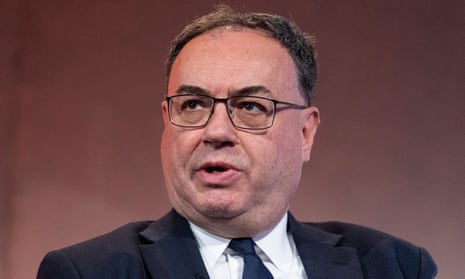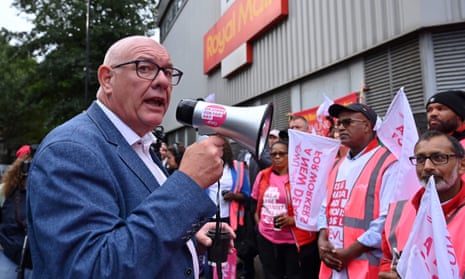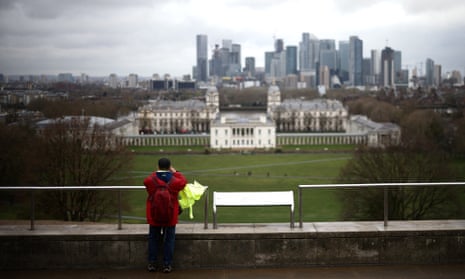Closing summary: Inflation data shock raises prospect of higher UK rates
Bank of England governor Andrew Bailey does not think the UK is in a wage-price spiral, he said today. But the inflation surprise this morning has given watchers of the British economy plenty to think about.
UK consumer price index inflation dropped to 8.7%, the lowest since March 2022, but that was still higher than the average expectation of 8.2% in a poll of economists. Core inflation – which strips out volatile food, drink, energy and tobacco – actually rose, while food price inflation remained at 19%, near 45-year highs.
That pushed up expectations of further interest rate increases among financial market participants. Interest rate swaps suggested that rates are more likely than not to rise to 5.5% in November.
UK financial markets have certainly adjusted to the prospect of higher rates – which would likely lead to less economic activity and lower profits. The FTSE 100 has dropped by 1.9% today with under an hour of trading remaining, while the FTSE 250 index of mid-sized companies has dropped by 1.6%.
On bond markets, the yield on 10-year gilts (UK government debt) has risen significantly to 4.3%, its highest level since the response to the disastrous mini-budget helmed by Liz Truss and Kwasi Kwarteng.
Andrew Sentance, a senior adviser at Cambridge Econometrics and a former member of the Bank’s monetary policy committee, expects high rates in the UK for a long while yet. He said:
We are still not on top of inflation in the UK, as I have warned for some time. Markets now expecting UK Bank Rate to peak at close to 5.5 percent, but could still go higher if evidence of strong underlying inflationary pressures persists. https://t.co/OPmla75Ukk
— Andrew Sentance (@asentance) May 24, 2023
In other business news from today:
-
Strong sales of dresses, denim and office wear as well as more affordable food helped lift sales and profits at Marks & Spencer in the past year despite the effects of inflation on its business and customers.
-
Severn Trent has increased its dividend to more than £260m, despite growing public anger over payments made by water suppliers to their shareholders and executives.
-
A ballot of Royal Mail workers on a deal struck last month to end a bitter dispute over pay, jobs and working conditions has been suspended as the row between the postal firm and its union threatened to reignite.
-
SSE has set out plans to invest £40bn in clean energy over the next 10 years as it reported a near-doubling of its annual profits compared with the year before thanks in part to its fossil fuel power stations.
-
Virgin Orbit, the satellite launch company founded by British billionaire Richard Branson, will permanently cease operations, just months after a major mission failure.
You can continue to read our live coverage from around the world:
In the UK, Boris Johnson claims the publication of the Covid inquiry ruling unfairly implies he is holding back documents
In the US, Ron DeSantis is to kick off well-funded campaign to become the next US president
In our coverage of Russia’s invasion of Ukraine, the Russian ministry of defence says Ukraine made unsuccessful attack on Black Sea fleet reconnaissance ship
Key events

The UK is set to win a battle against Spain to attract a new battery “gigafactory” to be built by Jaguar Land Rover owner Tata, the BBC has reported.
Indian conglomerate Tata has been openly weighing up two possible locations for a battery factory to supply Jaguar Land Rover, Britain’s largest carmaking employer, amid lengthy negotiations with governments for support worth hundreds of millions of pounds.
The threat of losing the factory to Spain has prompted the UK government to bow to intense pressure and offer financial support worth £500m for the plant. Many in the auto industry believe the project is vital to retain a meaningful car industry in the UK as it transitions to electric vehicles – although some analysts suggest this is not the case.
Tata’s chairman, Natarajan Chandrasekaran, is scheduled to meet Prime Minister Rishi Sunak mid-next week, the BBC reported. It said:
Sources familiar with the matter say that although the deal has yet to be signed, engagement has moved from negotiations to drafting and choreography of how the landmark agreement will be presented.
A key part of the support on offer for the gigafactory is help with energy costs. Batteries require large amounts of energy to produce, and the UK has higher costs than much of the rest of Europe.
The UK government has already offered Tata, which also owns UK businesses including Tetley Tea, a £300m package to help upgrade and decarbonise its Port Talbot steelworks facility in south Wales.

Rupert Neate

More than 100 climate activists are still being detained following a peaceful protest at Europe’s largest private jet trade fair in Geneva on Tuesday.
The demonstrators on behalf of Greenpeace, Stay Grounded, Extinction Rebellion and Scientist Rebellion were arrested at Geneva Airport after chaining themselves to private jets in protest against the sector’s carbon emissions.
Sandy Bouchat, spokeswoman for the Geneva airport, said the protest forced the airport to temporarily shut to both outbound and inbound flights for about an hour for security reasons. Seven flights were diverted and others were delayed.
The activists said they did not enter the taxiways or runways of the airport and did not intend to disrupt commercial air traffic.
Andrew Bailey: City focus on safe assets holding back growth-boosting investments

Richard Partington
Bank of England governor Andrew Bailey has waded into a growing debate over the ability of British companies to secure investment in the City of London, amid concerns over a lack of productive investment by financial firms.
It comes as City bosses warn regulatory reforms are required from the government, as the UK risks falling behind other global financial centres after Brexit.
Saying that “sensible” regulatory reforms to encourage risk taking by firms were required, Bailey warned: “If we don’t do that I think we’ve got a problem on our hands, going back to the point about the potential growth rate of the economy.”
The Bank’s governor said one potential reason holding back risk-taking investment in British firms was the prevalence of small pension funds in the UK. “The problem with that world is the economies of scale,” he said at an event in London held by the Wall Street Journal. “[The UK] has probably become too focused on relatively low-yielding assets.”
“I think we’ve got to think about what is the right structure and operating model for that world to get the right balance between saving, risk taking and productive investment.”
Immediately after Bailey on the panel, Legal & General chief executive Nigel Wilson welcomed his comments about the UK pension system – and also highlighted a more general problem with developing promising research into larger businesses.
We have a disproportionately large pension system in the UK, but we’re not directing it to the right place.
Relatively speaking we have the best IP in the world… In terms of the R in R&D [research and development] I’d give us an A*; in terms of the D I’d give us a D.
No inflation spiral
Bailey also suggested it is too soon to know if the government will meet its target of halving inflation this year.
Speaking at an event in London hosted by the Wall Street Journal, the Bank of England governor said forecasts made by the central bank earlier this month showed that Rishi Sunak was on track to meet his central economic goal.
However, asked whether April’s inflation figures changed the dynamic, he added: “I think we’ve obviously got to see how the news and the evidence unfolds.”
The Bank’s governor warned headline inflation was taking longer than expected to fall back to sustainable levels amid the impact from soaring food prices. “I have to say it is taking longer, and it is higher that was expected certainly earlier this year.”
Bailey dismissed the idea that Britain was experiencing a wage-price spiral, when workers demanding higher pay settlements adds to inflationary pressure. However, he warned that pay deals were contributing to the “stickiness” of the UK’s highest inflation rate in decades.
I don’t think spiral is the right word to use. That gives you a connotation of things that are marching upwards. It’s the stickiness downwards and the question of how fast is it going to come down…. Bear in mind that we’ve got a very tight labour market in this country.
Bank of England governor: UK not in a wage-price ‘spiral’

Bank of England governor Andrew Bailey has said the UK is not in a wage-price “spiral”, in an interview on inflation on Wednesday.
Bailey said that he does not think “spiral” is the right word to use, when asked about core inflation and wages at an event run by the Wall Street Journal.
It was too soon to know if the government’s goal of halving inflation this year had been put in peril by today’s surprisingly high inflation reading, he said. Inflation at 8.7% was higher than the 8.2% expected by economists, although Bailey said it was still a welcome decline from above 10%.
However, food inflation is taking longer to fall than expected, he said.

Mark Sweney

Shares in Embracer, the gaming group with rights to Lord of The Rings, The Hobbit and Tomb Raider, plunged more than 40% after the company said a $2bn partnership had fallen through.
The publicly-listed Swedish gaming giant, which had been valued at more that $4.6bn (SKr49.19bn), plunged 44% as the company slashed its earnings forecast for the year as a result.
The company, which has spent billions snapping up gaming studios and valuable intellectual property in the last few years, said that it was informed on Tuesday that a strategic partnership it had been negotiating for seven months that would deliver $2bn in revenue over six years “will not materialise”.
Lars Wingefors, chief executive at Embracer, said:
It has been a challenging year, adversely impacted by game delays, weaker consumer demand and lackluster reception for certain notable releases. Late last night, we were informed that one major strategic partnership that has been negotiated for seven months will not materialise.
As a result, Embracer said it now expects to generate SKr7bn ($658mn) to SKr9bn in adjusted earnings before interest and tax in the current financial year, down from SKr10.3bn to SKr13.6bn. “In as far as failure to conclude deals go, a ‘miss is as good as a mile’, and unfortunately, this is what Embracer has delivered,”said Thomas Singlehurst, analyst at Citi. “We would hope this will be a clearing event.

Deliveroo workers have staged a protest outside the takeaway delivery company’s annual meeting in London calling for higher pay.
The company has faced a long-running campaign by workers represented by the Independent Workers’ Union of Great Britain (IWGB) for higher pay, although it last year agreed a deal with another union, the GMB.
From a corporate point of view Deliveroo’s meeting passed off without a hitch: it received 97% or more of the votes for every shareholder resolution.
Press Association was at the protest and spoke to some riders. It reported:
Joe Durbidge, 31, who has worked for Deliveroo for four and a half years, told the PA news agency on Wednesday he has worked 50-hour weeks and been paid around as little as £2.90 per delivery. “Conditions are deteriorating constantly but my fees have never gone up since I started,” he said. “Nobody’s satisfied with the job. It’s crazy. “It’s very hard work, it takes a lot out of you and it’s hard to make a living.
Ahead of the meeting, a Deliveroo spokesperson said:
Deliveroo offers riders flexible work, attractive earning opportunities and security while they work. We see thousands of applications from people wanting to be riders each week, high satisfaction rates and very strong retention rates of those who sign up. We work closely with riders to make sure the work we offer reflects what they tell us they value.
Postal workers’ union delays vote on deal with Royal Mail

The main postal workers’ union has said it will not put an agreement with Royal Mail to its members for confirmation until the company stops “attacks” on its members.
The Communication Workers Union (CWU) on Wednesday said it will suspend the previous timetable for a member vote until it is satisfied.
In a letter to its members, Dave Ward and Andy Furey, the union’s general secretary and his deputy, wrote:
The position reached with Royal Mail Group is the right agreement for this moment in time. Set against the most brutal dispute in our history, a self-inflicted but very real financial crisis for the company and jointly agreed need for change, this agreement will secure the future of the company, jobs, and the service.
However, what has become clear is the environment we are attempting to deliver this agreement in remains toxic.
The CWU said it still backed the deal, but wanted Royal Mail to bring in “immediate measures” to “restore quality of service”. That would likely include steps to address missed delivery targets highlighted this month by Ofcom, the regulator.
The union also wanted a “mass zoom meeting” between the company and every CWU representative, and for the company to give every branch their proposed finishing times.
Royal Mail Group National Agreement – ballot timetable suspended.
We will put the agreement out to vote – but only when Royal Mail stop their attacks on our members.
Full info: https://t.co/3a6bdFRegg
— The CWU (@CWUnews) May 24, 2023

The FTSE 100 is now down 1.75% for today. That has pushed it to its lowest since early April, at one point hitting 7,621 points, its lowest since the end of March.
Housebuilders are still at the bottom of the pile for London’s benchmark index today. Higher interest rates are likely to dampen demand for houses – even if big price decreases are unlikely given the long-running lack of new supply.
Of the housebuilders, Persimmon lost 5.3%, Taylor Wimpey lost 5.1%, Barratt Developments lost 4.9% and Berkeley Group lost 4.2% at the time of writing.
The pound is also down by 0.2%. A fall in sterling usually helps to ease the pains of the FTSE 100, but it won’t make up for the bigger dent in company profits if interest rates are tighter.

Joanna Partridge

The UK’s competition watchdog has provisionally found that five major banks broke competition law by unlawfully exchanging sensitive information about British government bond trading in online chatrooms.
These discussions could have prevented taxpayers, savers and other financial institutions from getting the full benefit of competition for these products, according to the CMA.
In the aftermath of the global financial crisis, and at varying times between 2009 and 2013, a small number of traders working at the banks exchanged information in chatrooms on Bloomberg terminals relating to the buying and selling of UK government bonds, commonly referred to as gilts, according to the CMA.
You can read the full report here:


